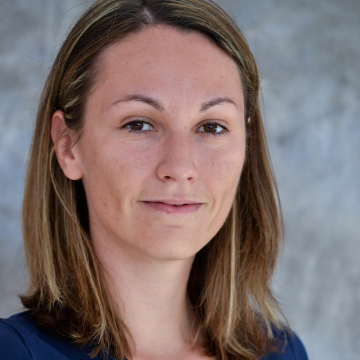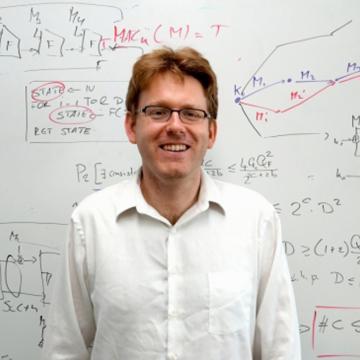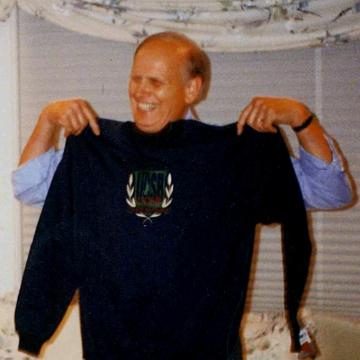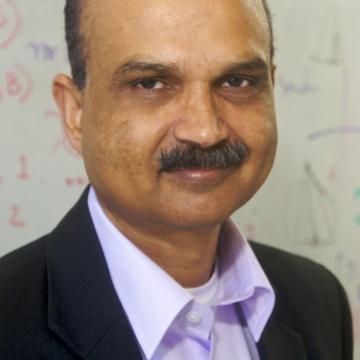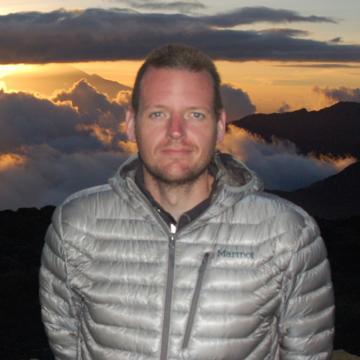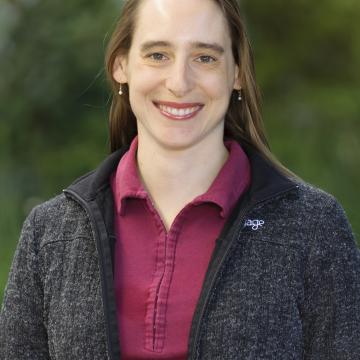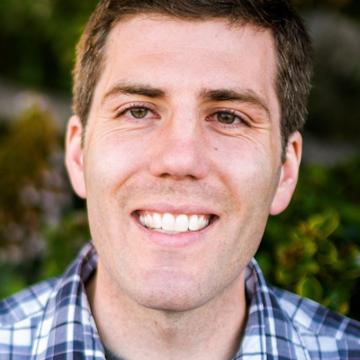News Archive
Congratulations to UCSB CS Professor Tim Sherwood, who was recently named an Association for Computing Machinery (ACM) Distinguished Member. This year the ACM selected 49 scientists, engineers, and educators from universities, corporations, and research institutions for their significant contributions to the field of computing. ACM President Alexander Wolf hailed these ACM members as “drivers of the advances and inventions that are propelling the information revolution in new directions.
The ACM International Conference on Multimodal Interaction has awarded Prof. Matthew Turk the inaugural ICMI Community Service Award, presented at the ICMI conference banquet on November 13th, for his contributions to the multimodal interaction research community.
Haitao (Heather) Zheng, Professor of Department of Computer Science, University of California, Santa Barbara, has been named an IEEE Fellow (class of 2015, effective 1 January 2015). She is being recognized for contributions to dynamic spectrum access and cognitive radio networks.
Congratulations to UCSB CS Master's student Nevena Golubović on receiving the 2014 Google Anita Borg Memorial Scholarship!
UCSB Professor Ben Zhao was recently interviewed for an LA Times article regarding user privacy and tracking concerns of Whisper, a social media application where users post anonymous confessions. Location privacy is an issue as Whisper uses location information to customize user experiences, though not all users consent to the company knowing their exact location. Prof. Zhao contacted the company in the spring when his research group found a security flaw which allowed the exact location of a Whisper user to be identified.
Journalist and blogger Marin Gazzaniga recently asked PhD student Yan Shoshitaishvili for advice on commonly heard ways to prevent hacking attempts. He suggests tweaks on commonly heard advice such as using long, easy to read passphrases instead of short strings of jibberish.
The full post can be found here.
UCSB Professors Matthew Turk (Dept. of Computer Science) and Danielle Harlow (Gevirtz School) have received a $40,791 grant from the National Science Foundation titled "US-Finland Planning Visit: Transformed Social Interaction and Telecollaboration for Collaborative Learning." The grant supports a short visit to Finland for several UCSB faculty and students in order to catalyze a new innovative research program aimed at developing new technologies for collaborative education and learning.
UCSB Department of Computer Science faculty Linda Petzold is one of three leading international scientists appointed to receive an honorary doctorate from Uppsala University next January.
A paper co-authored by Professor Tevfik Bultan titled Automatic Verification of Interactions in Asynchronous Systems with Unbounded Buffers received the ACM SIGSOFT Distinguished Paper Award at the 29th IEEE/ACM International Conference on Automated Software Engineering (ASE 2014).
UCSB Department of Computer Science Professors Heather Zheng and Ben Zhao have received a 3-year grant from the NSF EARS program (Enhancing Access to the Radio Spectrum). The EARS program seeks to identify bold new concepts with the potential to contribute to significant improvements in the efficiency of radio spectrum utilization. This project will develop efficient spectrum monitoring and enforcement systems to detect and locate unauthorized spectrum users.
Department of Computer Science Professor Ben Hardekopf is one of three UCSB faculty to receive the National Science Foundation’s Faculty Early Career Development (CAREER) award.
“An NSF CAREER award makes it possible for an assistant professor in science or engineering to launch an ambitious research program,” said Michael Witherell, UCSB vice chancellor for research. “We are extremely pleased that two of our engineering faculty and one of our physics faculty have won these extremely competitive awards.”
Want to be an entrepreneur? Don’t go to Wharton or Harvard. Instead, grab your surfboard and head to UC Santa Barbara....
Click to see full article at Forbes.com
Eucalyptus Systems, which was started in 2009 by Professor Rich Wolski, UCSB Computer Science researchers Chris Grzegorczyk, Daniel Nurmi, Graziano Obertelli, Neil Soman, Dmitrii Zagorodnov, and local entrepreneur Woody Rollins, has agreed to be acquired by Hewlett Packard.
UCSB Professor Divy Agrawal was a featured keynote speaker at the 40th International Conference on Very Large Data Bases (VLDB 2014) in Hangzhou, China. The keynote address was structured as a joint talk comprising an industrial and academic speaker. The industrial speaker with Dr. Agrawal was Dr. Shivakumar Venkataraman, Vice President of Advertising Infrastructures from Google. The two of them spoke on the topic of datacenters as a new architecture from an engineering perspective and from a database research perspective.
Buggy software is as annoying as it is a waste of both time and money. With more web-based software being downloaded into more devices every day — as opposed to native software dedicated to specific machines — the potential for stalls and diminished functionality grows. Additionally, bugs can leave devices vulnerable to security breaches. And, they’re just aggravating.
UC Santa Barbara computer science professor Matthew Turk has been elected Fellow by the International Association for Pattern Recognition (IAPR). He is cited by IAPR for his "contributions to computer vision and vision-based interaction."
Turk was chosen from a select group of IAPR members: Only .25 percent of the organization’s membership is eligible for election to Fellow in any given two-year period. He received his award at a ceremony of the International Conference on Pattern Recognition in Stockholm, Sweden.
Professors Matthew Turk and Tobias Höllerer of the Four Eyes Lab were awarded a $477,428 National Science Foundation grant for a project titled "Crowd-Sourcing the World: Scalable Methods for Dynamic Structure from Motion.
Around 400 of the best cryptology researchers met at UCSB this past week for CRYPTO 2014, one of the world's premiere cryptology conferences. For five days, attendees were immersed in talks and presentations on campus, both formal and informal, on a dizzying array of topics related to cryptology: random number generation, cipher models, security and attacks, password protection, new technologies and trends in the digital world, just to name a few.
UCSB alumnus Aydın Buluç is working on energy-efficient parallel graph and data mining algorithms as part of a 2013 DOE Early Career award grant at Lawrence Berkeley National Laboratory. In recent years technological advances have led to an explosion of data that is being generated faster than it can be analyzed. Graph abstractions provide a natural way to represent relationships among these large data sets, but existing algorithms consume too much energy per operation. Dr.
From flash mobs at the local mall to trending activist hashtags, social networks have quickly integrated themselves into modern human life and become a tool for instantaneous global communication. Every day, an estimated 700 million people (out of billions of registered users) worldwide are weighing in on the top social networking sites, swaying others, making decisions and forming relationships in a constant torrent of information.
Prof. Fred Chong is co-principal investigator with Prof. Ken Brown (GATech) on a new $480K National Science Foundation research grant to study quantum error correction schemes. The main challenge for building a quantum computer is that quantum components are prone to error. Chong and Brown will investigate surface codes, a new class of error correction codes for quantum computers. Surface codes are ensemble codes that more efficiently code redundancy into large collections of quantum bits.
PayScale recently ranked colleges based on the earning potential of computer science graduates and UCSB ranked #3. Rankings were based on the median staring salaries and mid-career salaries of computer science alumni.
The top 20 list can be found in the Network World article here.
In the era of Internet and social media, where much of our communication happens online, it’s easy to take our privacy for granted and to trust that the messages we send and transactions we perform are kept unreadable to prying eyes.
But according to UC Santa Barbara cryptologist Stefano Tessaro, even the most widely used standardized cryptographic algorithm, the Advanced Encryption Standard (AES), could be only a break-in away from being catastrophically compromised.
Recently KCLU's Lance Orozco interviewed Prof. Giovanni Vigna to discuss a recent National Science Foundation grant to study trust violations in smartphones. The adoption of smartphones has steadily increased in the past few years, and smartphones have become the tool with which millions of users handle confidential information, such as financial and health-related data.
You’re on your smartphone, browsing through Facebook. In a fit of productivity, you search for, say, a project management app to help you use your non-Instagram and cat video time more effectively. You download and install the first one you come across … only to find that it doesn’t do anything. No reminders, no calendar, no clock, nothing.
Oh, well. You exit the app and go back to Facebook.
Forbes recently ranked the most entrepreneurial universities in the US based on the percentage of alumni who became business founders and owners and this year UCSB came in at #20.
The full list can be found here.
Dr. Martin Holoien passed away on July 18, 2014. Marty had a long association with the Department. He joined as a Lecturer back in early 80's when the department consisted of only eight faculty members. He moved from Minnesota after a distinguished career as Chair of the Department of Computer Science at Moorhead State College (now Moorhead State University) and Director of its Computer Center. He published several computer science textbooks and taught many different courses at UCSB including introductory courses for computer science and for engineering students.
Professor Tevfik Bultan recently received a National Science Foundation grant for a project titled "Data Model Verification". The three-year, $499,888 grant will seek to develop innovative approaches to software verification, particularly focusing on code that manipulates and updates the data in modern software systems.
Professor Ambuj Singh has been appointed the new Chair of the Department of Computer Science, effective July 1, 2014. Singh takes over the reins from Prof. Subhash Suri, who is returning to full time research and teaching after serving as Chair for the past three years.
Each year a committee of industry experts and faculty chooses 10 papers from the top conferences to highlight in the annual "Top Picks" issue of IEEE Micro — and UCSB yet again has a paper on the list. This year the paper is titled "SurfNoC: A Low Latency and Provably Non-Interfering Approach to Secure Networks-On-Chip" and represents a collaboration between UC Santa Barbara, UC San Diego, and the Naval Postgraduate School.
A team of researchers at UCSB, led by Prof. Ben Zhao have explored a practice they've coined "crowdturfing" in which organizations create a false positive reputation on social networks such as Facebook, YouTube, or Twitter. They've discovered that much of the activity on crowdsourcing websites involves asking workers to follow or like particular social network posts. In an effort to identify crowdturfing they have developed machine learning software which can detect crowdturfers on China's version of Twitter with 95 to 99 percent accuracy.
The National Science Foundation has awarded more than $1 million to a project led by Prof. Giovanni Vigna to model trust between users and smartphones. The model will explore how cybercriminals can take advantage of users' misplaced trust and will consider ways to secure these weaknesses. See the full announcement here.
Outstanding Graduate Student: Aaron Elmore
Outstanding Publication: Ivan Bocic, Madhukar Kedlaya
Outstanding Dissertation: Gianluca Stringhini, First Place
Muath Alkhalaf, Honorable Mention
Steffen Gauglitz, Honorable Mention
Paul Schmitt, a second year PhD student in CS, received the UCSB Dean's Fellowship for 2014-15. Paul is a member of the MOMENT Lab where he is advised by Prof. Elizabeth Belding. His research is focused on developing wireless network solutions to provide or improve Internet connectivity and performance in under-resourced regions.
ShadowMaps, the team that created a cloud-based service software, including Computer Science PhD student Danny Iland, took home the grand prize in the recent New Venture Competition at UCSB, sponsored by the Technology Management Program. Congratulations, Danny and the ShadowMaps team!
For more information, see the Noozhawk article here.
Congratulations to the following students who plan to graduate in 2014 with a Master's degree from the CS department:
Nadav Caspi
Leah Chatkeonopadol
Christopher Coakley
Siladitya Dey
Angus Forbes
Vivek Goswami
Erdinc Korpeoglu
Smruthi Manjunath
Sivabalan Narayanan
Yifan Shen
Zhe Song
Yilei Wang
Nazli Dereli
Geoffrey Douglas
Shivapriya Hiremath
Christopher Horuk
Kyle Macnamara
Sean Maloney
Alex Morales
Mock Suwannatat
Bo Yang
Liang Xia
Congratulations to the following students who have graduated over the past year with PhD degrees from the CS department:
Nan Li
Hebatallah Saadeldeen
Hassan Wassel
Aaron Elmore
Jaideep Nijjar
Maha Alabduljalil
Muath Alkhalaf
Adam Doupe
Kyle Klein
Gianluca Stringhini
Hakan Yildiz
Adam Lugowski
Wei Zhang
Zengbin Zhang
Steffen Gauglitz
Jeff Browne
Arijit Khan
Bita Mazloom
Lara Deek
Congratulations to the following students who plan to graduate with a bachelor's degree in Computer Science in 2014:
Prof. Diana Franklin was a Program co-Chair for two recent key computing conferences: the Southern California Celebration of Women in Computing that took place in the San Diego area in April, and the ACM International Conference on Computing Frontiers that took place ths week in Cagliari, Italy.
Dr. Jonathan Ventura, who received his PhD from the department in 2012, is joining the Department of Computer Science at the University of Colorado Colorado Springs (UCCS) as an Assistant Professor. Dr. Ventura was a member of the Four Eyes Lab, advised by Prof. Tobias Hollerer, and his dissertation topic was "Wide-Area Visual Modeling and Tracking for Mobile Augmented Reality." He also received his BS and MS degrees in Computer Science at UCSB.

